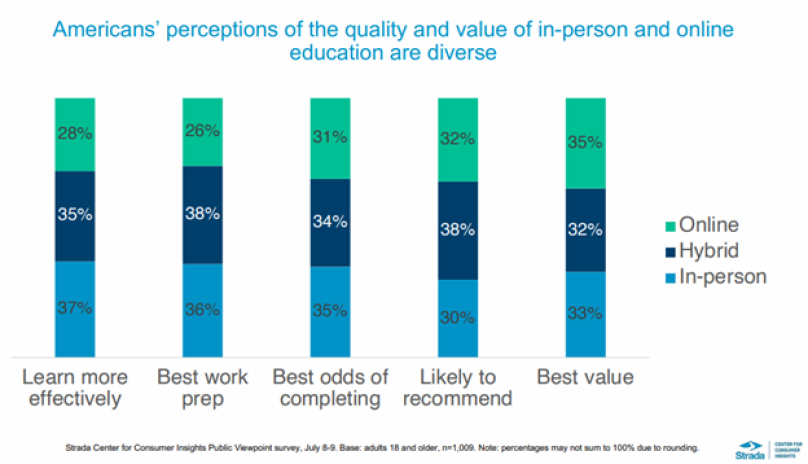Strada Education Network study of attitudes towards different educational formats
A study by the Strada Education Network has shown how attitudes towards in-person, blended (hybrid) and online education differ.

The majority of the respondents indicated that online education offers the best value for money. However, a significant percentage of respondents also were of the opinion that they do not consider this method of teaching to be effective.

59% of Americans still believe that, employers value classical education more than online education. This is a debatable statement: if the applicant himself does not volunteer the information that he studied online, the employer may never come to know about it. Furthermore, many employers even subsidize online employee training.
Attitudes towards online education also vary greatly within different demographic groups. For example, 25 to 49 year-olds are highly enthusiastic about learning online. African Americans are also positive about online education; they believe that the online format will help them avoid racial discrimination.
Interest in online education was showing signs of growing even before the onset of the pandemic, the spread of the coronavirus and the consequent calls for isolation only heightened this interest. The epidemic had a significantly greater influence on the choice of the educational format for women than for men. Before the outbreak of the pandemic, only 28% of women planned to study entirely online, whereas this number increased to 48% after the outbreak. For men, the numbers did not change so much: before the start of the pandemic, 27% of respondents planned to receive online education, after - 33%. Researchers attribute this gap to the fact that there is a higher probability of women losing their jobs during a pandemic and will more likely be required to care for family members and relatives if such need arises.












 Test: How Psychologically Mature Are You? Check Your Inner Foundation.
Test: How Psychologically Mature Are You? Check Your Inner Foundation.
 Test. Check Your Social Media Dependency Level!
Test. Check Your Social Media Dependency Level!
 Test: What Business is Right For You?
Test: What Business is Right For You?
 Test: How Prone Are You to Abusive Behavior as a Manager?
Test: How Prone Are You to Abusive Behavior as a Manager?
 Test. What superpower would you possess if you were a superhero?
Test. What superpower would you possess if you were a superhero?
 Test. What Should You Let Go of Before Winter Ends?
Test. What Should You Let Go of Before Winter Ends?
